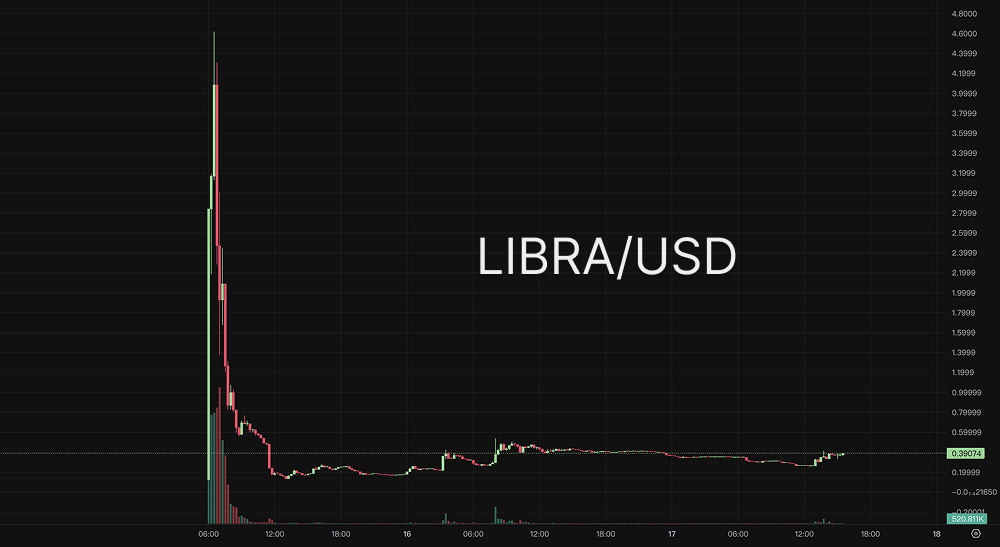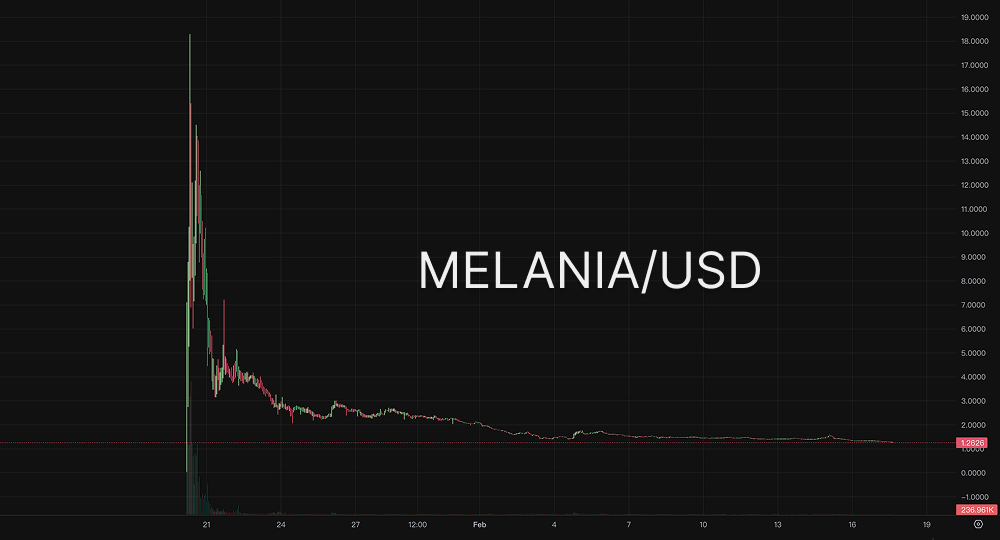The blockchain data analysis company Bubblemaps recently released an in-depth investigative report, revealing for the first time, with irrefutable on-chain evidence, that these two seemingly independent cryptocurrency projects are actually meticulously planned and manipulated by the same behind-the-scenes team. The report points out that this team profited over $100 million in just a few months through common tricks such as front-running and liquidity extraction, leaving countless investors with significant losses.
The Farce of the "Argentinian President's Endorsement" and the Collapse of the "First Lady Effect"
The farce surrounding the LIBRA token began on February 15, 2025, when Argentina's newly elected president, Javier Milei, posted a series of promotional content related to the LIBRA token on his social media platform. Prior to this, Milei had met with the project's technical advisor, Hayden Davis, and the president's public endorsement undoubtedly injected unprecedented market enthusiasm into the LIBRA token. Investors flocked in, hoping to ride the wealth train of the "presidential concept coin."
However, the market's fervor lasted only a few hours. Shortly after the LIBRA token went live, the project team suddenly withdrew as much as $87 million in USDC and SOL stablecoins from the liquidity pool. This abrupt "extraction" triggered market panic, causing the LIBRA token price to plummet over 80% in a short time. Faced with massive losses for investors and strong public condemnation, Milei quickly deleted all tweets related to the LIBRA token and claimed he was "not clear on the details" of the project, merely "casually supporting a private entrepreneurial project unrelated to himself." To quell public outrage, the Milei government even initiated a so-called "anti-corruption investigation," but these measures seemed feeble to investors who had already suffered significant losses.
The LIBRA project team also began to shift blame among themselves. KIP Protocol claimed its role was limited to "technical oversight," while market maker Kelsier Ventures' representative Hayden Davis pointed fingers at the "presidential team," accusing them of "backtracking at the last minute," which triggered market panic. However, these weak justifications could not cover up the massive losses suffered by investors or the questionable role played by the project team.
The MELANIA token, associated with First Lady Melania Trump, launched in January 2025 and also quickly surpassed a market capitalization of $10 billion on its first day, thanks to celebrity effect. However, this good fortune was short-lived; after a brief celebration, the MELANIA token faced accusations of "insider selling," leading to a rapid price collapse and a significant reduction in market capitalization to less than $2 billion.
The model of the MELANIA token is highly similar to that of LIBRA, both leveraging celebrity effect to quickly attract retail investors, only to later "harvest" through liquidity extraction and other means. The consecutive occurrences of these two events prompted the crypto community to reflect on whether there are deeper connections and conspiracies behind these seemingly coincidental collapses.


Bubblemaps' On-Chain Evidence: The "Harvesting Chain" Controlled by the Same Team
In response to the skepticism from the crypto community, the blockchain data analysis company Bubblemaps intervened in the investigation and released a weighty analysis report that revealed the astonishing connections behind the LIBRA and MELANIA tokens. Bubblemaps' analysis is not based on subjective speculation but is built on solid on-chain data, tracking and analyzing transaction records on the blockchain to reconstruct the "harvesting chain" of the behind-the-scenes team.
The "Self-Directed" MELANIA Token
Bubblemaps' analysis first focused on the MELANIA token. The report pointed out that a Solana address named "P5tb4" played a key role in MELANIA token transactions. This address engaged in front-running (i.e., using technical advantages to buy MELANIA tokens as soon as they went live) and profited as much as $2.4 million in a short time. Subsequently, this address transferred the substantial profit to an Avalanche address named "0xcEA" via a cross-chain protocol (CCTP).
Even more shocking, Bubblemaps further confirmed that the address "0xcEA" has a direct connection to the creator of the MELANIA token. This means that the behind-the-scenes team of the MELANIA token not only participated in the token's issuance but also used insider information to lay out their strategy in advance, harvesting retail investors' funds in the public market through means such as front-running. This "self-directed" model of "pump and dump" fully exposes the greed and fraudulent nature of the behind-the-scenes team.
The "Same Script" for the LIBRA Token
Bubblemaps' investigation did not stop at the MELANIA token. Analysts keenly noted that the address "0xcEA" appeared again during the issuance and trading of the LIBRA token. On-chain data shows that the address "0xcEA" provided funding support to the LIBRA token creator address "DEfcyK" and engaged in front-running trades on the LIBRA token through multiple associated wallets, profiting as much as $6 million. Meanwhile, the LIBRA project team also followed suit, withdrawing $87 million from the liquidity pool, further exacerbating the price collapse of the LIBRA token.
Even more convincing evidence is that on-chain data shows that the wallet addresses that early purchased LIBRA tokens highly overlap with those that previously participated in MELANIA token transactions. Additionally, these wallet addresses are also linked to several previously exposed "Rug Pull" projects such as TRUST, KACY, and VIBES. These chains of evidence corroborate each other, pointing to a shocking conclusion: the LIBRA and MELANIA tokens, as well as a series of "Rug Pull" projects like TRUST, KACY, and VIBES, are likely to be long-term manipulated by the same gang.
The "Ironclad Evidence" of Cross-Chain Fund Flows
To further cover up their actions, the behind-the-scenes team cleverly utilized cross-chain protocols for fund transfers. Bubblemaps, through in-depth analysis of transaction records on blockchains such as Solana and Avalanche, discovered that the address "0xcEA" frequently used cross-chain protocols to transfer funds, attempting to obfuscate the true flow of funds. For example, the profits from the MELANIA token, after being converted to USDC stablecoin via CCTP, ultimately flowed into the wallet of the LIBRA token creator. This pattern of cross-chain fund movement provides "ironclad evidence" for Bubblemaps' analysis, further confirming the inference that the manipulators behind the LIBRA and MELANIA tokens are the same gang.
Related Parties and Interest Networks: Core Figures and Institutions Surface
As Bubblemaps' investigation deepens, the interest network of the manipulators behind the LIBRA and MELANIA tokens gradually comes to light.
Kelsier Ventures: Accused of Being the Market Maker for LIBRA
Kelsier Ventures is a cryptocurrency market maker, and its founder Hayden Davis has been accused of being one of the core figures behind the LIBRA token project. Crypto community KOLs even referred to Hayden Davis and his family (including his father Tom Davis and brother Gideon Davis) as a "family crime syndicate." Kelsier Ventures has been accused of playing a disreputable role in the issuance and trading of the LIBRA token, suspected of engaging in insider trading and liquidity extraction.

KIP Protocol: Technical Oversight or Collusion?
KIP Protocol is a blockchain technology company, and the LIBRA project team previously claimed that KIP Protocol was only responsible for the project's "technical oversight." However, after the collapse of the LIBRA token, KIP Protocol's representative Julian Peh was hinted by Hayden Davis to be a "scapegoat." What role KIP Protocol actually played in the LIBRA project—whether it was merely a technical provider or had colluded with the behind-the-scenes team—remains to be further investigated.

Community Reflection and Calls for Regulation: A Crisis of Trust and Urgent Need
The collapse of the LIBRA and MELANIA tokens has undoubtedly intensified the "crisis of trust" within the crypto community. Developer Farokh publicly called for the exposure of all KOLs who receive marketing fees in an effort to clean up industry chaos. Notable KOL Dave Portnoy even revealed that he "had insider information," further exposing potential corruption issues within the cryptocurrency industry. The founder of Argentina's Lambda Class pointed out that such events severely damage the reputation of Argentina's crypto industry, and many honest builders have been implicated as a result.
Expert Opinions: Market Participants Deeply Entrenched in a "Greed Game," Self-Regulation and Regulation Urgently Needed
In response to the LIBRA and MELANIA token incidents, as well as the current chaos in the cryptocurrency market, several industry experts and community leaders have expressed their views, generally believing that market participants are deeply entrenched in a "greed game," and that strengthening industry self-regulation and regulation has become an urgent priority.
Researchers Samczsun from Paridigm, Toly, co-founder of Solana, and crypto KOL Cobie engaged in an in-depth discussion about this incident on social media. Cobie bluntly pointed out that the current market development trajectory is characterized by "market participants rushing into these scams like moths to a flame, most of whom know they are scams, but their goal is to sell to the next buyer at three times the price." He believes that many investors are not pursuing long-term value but are eager to "get rich quick" in the short term, a mindset that fosters a speculative atmosphere in the market and provides fertile ground for "harvesting" behaviors.
Cobie further noted that there is currently no effective way to "shame" those shameless fraudsters. Even exposing their misdeeds is unlikely to stop them from continuing to deceive, because "the cyclical nature of the crypto industry means that there will always be new entrants to fill the void left by old users, so these people can always find a new audience." In the absence of "truth arbiters," the market often falls into a vicious cycle of "bad money driving out good."
Regarding how to change this situation, Cobie believes that investors need to experience sufficient losses to truly realize the risks of participating in the "greater fool game." He stated, "If you lose 10 times, you will stop playing this game." Only when investors stop blindly chasing short-term profits can the market return to rationality, and fraudulent behaviors can be effectively curbed.
Meanwhile, experts are also calling for enhanced industry self-regulation and oversight. Developer Farokh urged the exposure of all KOLs who receive marketing fees to improve industry transparency. Industry experts suggested strengthening the application of on-chain monitoring tools and establishing disclosure rules for celebrity-endorsed tokens to reduce information asymmetry. The Argentine government has formed a cross-departmental investigation team to investigate the LIBRA token incident, which is seen as a positive signal of government regulatory intervention.
The LIBRA and MELANIA token incidents have once again sounded the alarm for risks in the cryptocurrency market.
Disclaimer: The above content does not constitute investment advice.
AiCoin official website: www.aicoin.com
Telegram: t.me/aicoincn
Twitter: x.com/AiCoinzh
Email: support@aicoin.com
Group chat: Customer Service Yingying、Customer Service KK
免责声明:本文章仅代表作者个人观点,不代表本平台的立场和观点。本文章仅供信息分享,不构成对任何人的任何投资建议。用户与作者之间的任何争议,与本平台无关。如网页中刊载的文章或图片涉及侵权,请提供相关的权利证明和身份证明发送邮件到support@aicoin.com,本平台相关工作人员将会进行核查。




